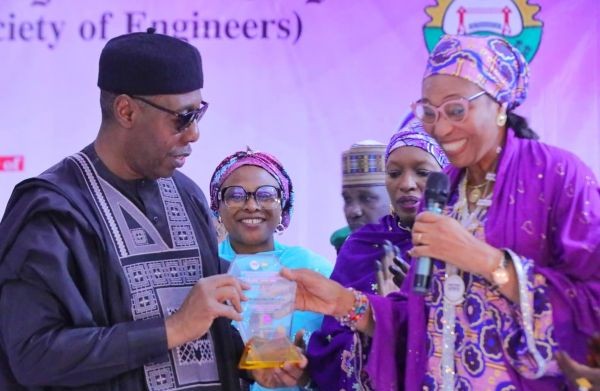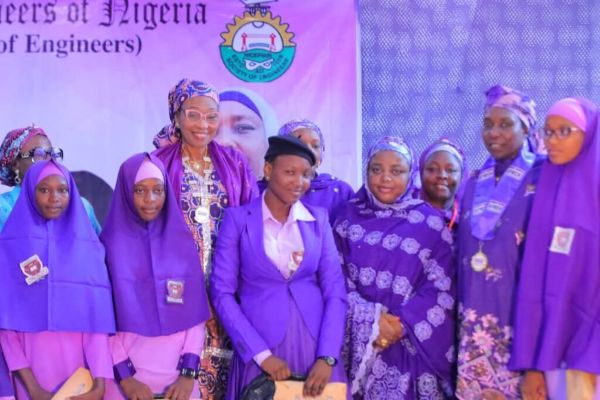Zulum Offers Full Scholarships to Borno’s High-Flying Girls in UTME, Champions STEM Education

In a bold stride to elevate girl-child education and tilt the gender balance in Nigeria’s STEM pipeline, Borno State Governor Prof. Babagana Umara Zulum has unveiled a full scholarship scheme for all female indigenes of the state who scored 250 and above in the 2025 Unified Tertiary Matriculation Examination (UTME).
The scholarship, announced on Saturday in Maiduguri, is targeted at encouraging exceptional female students to pursue degree programmes in Science, Technology, Engineering, Mathematics (STEM) as well as technical and vocational fields—long perceived as male-dominated domains in Nigeria’s education and labour market.
Zulum made the declaration at the inauguration of new executive members of the Association of Professional Women Engineers of Nigeria (APWEN), Maiduguri Chapter, an event that also featured a scholarship award ceremony facilitated by Dr. Habiba Babagana Zulum, the state’s First Lady.

STEM as a Tool for Female Economic Empowerment
“This initiative is about more than just rewarding academic excellence,” Zulum said. “It’s about breaking the cycle of gendered access to opportunities. We want to encourage our girls to dream bigger—into fields where they are historically underrepresented.”
The governor directed the State Scholarship Board, the Ministry of Education, his Acting Chief of Staff, and APWEN to begin the immediate identification and screening of eligible candidates. The fully funded scholarship will cover tuition, learning materials, and other study-related expenses in federal and state-recognised tertiary institutions.
Zulum’s latest policy move aligns with Borno State’s broader post-insurgency education rebuilding strategy, which places emphasis on female inclusion, digital skills acquisition, and technical competence as pillars of socio-economic reconstruction.
First Lady Advocates Mentorship as a Catalyst for Change
In a keynote address titled “The Role of Mentorship in Encouraging Girls to Pursue Engineering Careers in Nigeria”, Dr. Habiba Zulum underscored the need for structured mentorship programmes to raise a new generation of confident, competent, and visionary women engineers.
“Women represent just 14% of Nigeria’s STEM workforce. That must change,” she asserted, calling for community-wide efforts to demystify STEM professions, challenge gender stereotypes, and unlock the full potential of the girl-child.
According to her, mentorship is a powerful force in nurturing critical thinking, breaking socio-cultural barriers, and ensuring young girls see themselves in roles society has long reserved for men.
APWEN’s Local Impact Recognised
Outgoing APWEN Chairperson, Engr. Kori Shettima, took pride in the association’s grassroots advocacy and mentorship drive in Borno, stating that “we have touched lives and inspired young minds, especially in rural schools.”
The event culminated in the official inauguration of Engr. Hajju Tijjani Gazali as the 4th Chairperson of APWEN’s Maiduguri Chapter.
In a practical show of support, scholarships were awarded to 12 outstanding female students:
- ₦200,000 each to six top-performing female pupils from Wulari Primary School, and
- ₦300,000 each to six best science students of Federal Government Girls College, Monguno.
Insights: Why Zulum’s STEM Bet Matters
Zulum’s targeted investment in academically gifted female students is both visionary and economically sound. Across the globe, STEM industries represent the fastest-growing sectors, yet in Nigeria, female participation remains low, often constrained by deep-rooted cultural and institutional barriers.
By tying scholarship access to both merit (UTME scores) and strategic course areas (STEM/TVET), the Borno government is laying the groundwork for long-term gender equity in the knowledge economy. More importantly, it is creating a replicable model for other subnational governments aiming to leverage education as a tool for inclusive development.
This is more than a scholarship—it’s a policy blueprint for future-ready human capital development.












